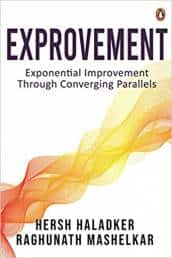Representational image. (Photo: Karla Hernandez via Unsplash) karlahrnndz
There are modest leaps forward and then there are big, epoch-marking transformations; this can be readily observed at both individual and institutional levels. This deceptively simple proposition lies at the heart of Hersh Haladker and Raghunath Mashelkar’s Exprovement: Exponential Improvement Through Converging Parallels (Penguin Business; releasing on April 24, available for pre-order online). This engaging and well-crafted book takes readers through a series of case studies from diverse worlds (manufacturing giants, environmental firms, NASA, toy manufacturers) to explain how companies achieve what the authors term ‘exprovement’; radical, paradigm-shifting improvements that change the very parameters of a problem.
 Exprovement: Exponential Improvement through Converging ParallelsHersh Haladker and Raghunath MashelkarPenguin Business256 pages, Rs 799
Exprovement: Exponential Improvement through Converging ParallelsHersh Haladker and Raghunath MashelkarPenguin Business256 pages, Rs 799
“Exprovements are primarily strategic in nature,” the authors explain, “and the operations of a business follow from the strategies so set. Improvements, on the other hand, are generally born out of keeping the users’ needs in mind and are more operational in nature. As a result, exprovements take much more time, effort, persistence and resources to come to fruition than improvements.”
The authors also make it a point to differentiate or explain commonly misunderstood terms/phrases used in boardrooms — stuff like ‘disruption’. This is very useful for the lay reader while also educating more familiar readers about the differences between the status quo and their ‘exprovement’ thesis. This bit of housekeeping out of the way, Haladker and Mashelkar roll out the case studies. A pragmatic choice they make at this point pays off big time; they start with case studies of consumer goods, automotive products — tangible, easily understood concepts that allow the reader to see how innovations here ended up having applications that went well beyond these industries.
Who doesn’t love an accidental invention story? All of us remember the story of Alexander Fleming and how he arrived at the idea behind penicillin. Exprovement has a number of fascinating stories in this context, my favourite being the story of Phil McCrory, a hair salon owner who ended up developing a tool that today helps us clean up large-scale oil spills. He got the idea in 1989 while watching a poor dead otter float up amid footage of the Exxon Valdez oil spill which happened that year — he noticed that the dead otter’s fur had absorbed almost all of the oil in the waters nearby. This was the ‘lightbulb moment’ for McCrory.
“McCrory’s inquisitive mind got thinking, and drawing a parallel
with all the waste hair that was collected at his salon every day, he
decided to experiment. He gathered a bunch of hair clippings, stuffed them into a pair of his wife’s pantyhose (so they would be contained, yet remain absorbent) and put the spongy device into a children’s wading pool filled with a mixture of water and motor oil. His intuition had been correct — within minutes the hair-pantyhose ‘sponge’ absorbed the oil from the water, turning it crystal clear!”
As we move through the book, the case studies keep getting more and more abstract, as the authors trust the readers to understand the core concepts by now. And so, the second half of the book focusses on decidedly contemporary concerns — cryptocurrency, big data and so on. Or the revolutionary concept of ‘time banking’. This is an example of an exprovement that’s still in the beta-testing phase. The idea is that by 2050, most developing economies around the world will be over-burdened by social security, especially the cost of looking after all-time-high elderly populations. To prepare for this, some countries are trying out the concept of ‘time banking’. In one’s youth, one can spend a certain number of hours to elder care — providing basic services or just spending time with them. These hours are then ‘banked’ and acquire interest just like money does. When you reach retirement age yourself, the number of ‘banked’ hours will entitle you to an equivalent number of caregiving hours.
It sounds simple and elegant but there are a number of societal, practical and enforcement issues with this ‘exprovement’— as the authors tell us on more than one occasion in the book, sometimes we have to bite the bullet and take unpopular decisions in order to test our potential exprovements. Like in Chapter 9, we meet a talented chef who decided to close their restaurant for half of the year — this time was then used to experiment, beta test new dishes, and come up with wholly original recipes that had no analogues or imitations anywhere else. Closing the restaurant for six months was a disruptive, counter-intuitive decision, but ultimately the right one because it led to a competitive edge in the long run — namely, the fact that no other restaurant offered anything like the dishes developed in this ‘laboratory phase’.
Exprovement teaches us how to give individuals and companies the best possible chance to achieve radical improvement within a relatively short time-frame. This book will be of interest to mid-career professionals in particular.